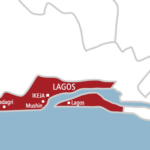Events unfolding in the country lately are not, in any way, what anyone will appreciate.
Of course, some may say that the looting of warehouses in many states in Nigeria by hoodlums – as the media will call them, partly because of their (in)action of looting or, to put it in a mild way, carting away of properties not possessed by them, but other individuals. The populace, who, by sheer stroke of ill-luck which they inarguably have no control over COVID-19, bear the lethal brunt of the novel pandemic that ravaged the country’s economy that was battling to stand on its feeble feet – shouldn’t, in whatever sense, be condemned because what was – and, still, is – meant for the citizens should, without the slightest hesitation, delay, go to them and not be kept in warehouses, some of which are favourable breeding grounds for rats, their immediate and distant families.
Earlier in October, a rather mild agitation over the activities of the Special Anti-Robbery Squad (SARS) unit of the Nigeria Police Force started on the internet.
On Twitter, for example, which is one social media platform with users who follow, with keen interest, national happenings and comments on same, an online peaceful protest started with the hash-tag #ENDSARS; that the government should, as a matter of urgency and necessity, disband SARS because of the inhumane activities of some members of SARS in some states, especially in the south.
A video of one of the SARS officers in a callous and merciless encounter with a certain civilian in some state uploaded on Twitter went viral, and you couldn’t say Jack Robinson before it permeated the nation’s fabrics, with hundreds of thousands of youth joining the protest and baring out what had been eating their hearts out.
In a matter of days, after the #ENDSARS on Twitter, Nigeria witnessed a bigger, gory version of what was witnessed in 2017, when youths took to the streets, mounting same and restricting vehicular movements, and calling on government to end SARS.
What started as a peaceful protests in some states and FCT later culminated into a non-peaceful protest because of the barbarism that marred the protests.
Government, giving the protesters their sheer constitutional right of airing their grievances didn’t make any attempt to disperse the protesters – and isn’t this one of the beauties of democracy, the system we prematurely embraced with full arms when we should have opted for other systems in congruence with our peculiar realities as a developing nation with developing problems!
But the narration was later to take another dimension – the one heavily criticised by the international community – as the government made it a point to bring to a halt what was seemingly becoming a threat to the country’s peace.
Days into the protest, the government, having found itself dilemma, succumbed to the demand of the angry protesters and disbanded SARS, announcing SWAT its replacement.
With the protest dying down and normalcy gradually returning but after the act of vandalism of government’s and other individuals’ properties in some states by hoodlums who hijacked the protest to achieve their who-knows-what goals, we still feel unsafe.
If one said it was government’s fault that things happened the way they did, an iota of truth worth mulling over could be said to be in the claim.
When you keep youths at home, with no job, no school to go to, because negotiations with ASUU can’t come to an end for some reasons, you know you are definitely inviting trouble at your door, which you either carelessly left ajar or had outlived its time.
So, some think and say, was the reason why we are now witnessing another unrest that is sending many governors on their toes, jolting them with the realisation that the very people they thought they have full control over and can scare at the faintest command of ‘go home and breath nothing of protest and agitation again’ have now gotten their voices.
The looting of warehouses in some states is surely sending a number of messages to our leaders, so that if nothing is done to arrest the issue, the nation’s peace will be at stake.
Although one can’t justify the carting away of properties by some Nigerians, one can’t justify the government’s hoarding of COVID-19 palliatives either.
The palliatives meant to be distributed amid the pandemic to cushion the effect of the hardship occasioned by the virus have no business being in warehouses at this time, especially now that the covid curve has flattened and the circumstances surrounding the management of coronavirus in the country are getting revealed.
If governors had done it the Babagana Zulum’s way by timely distributing the palliatives to those meant to be given, this wouldn’t have happened; for, who will care to loot an empty warehouse?
Governors who were reported as saying that they were about distributing when the incident happened or those who said that the looted foodstuffs and other items were poisonous would now have to bury their heads in shame; for, nobody would see credence in their assertions.
The boulders thrown on the soft bald of Sadiya Umar Farouq, the Minister of Humanitarian Affairs, Disaster Management and Social Development, these years could be enough to send her to a hospital for a head, nay brain, damage treatment. Now she’s been, at least in this regard, vindicated.
It’s about time we held our governors and representatives accountable, and it’s about time the government changed its thinking about the youth.
Do well, Mr Leader, by leading well and don’t loot, but if you do, what you loot will be looted, because it is now LIKE THE LEADERS, LIKE THE LED.
Rilwan Muhammad can be reached via [email protected]

 Join Daily Trust WhatsApp Community For Quick Access To News and Happenings Around You.
Join Daily Trust WhatsApp Community For Quick Access To News and Happenings Around You.


